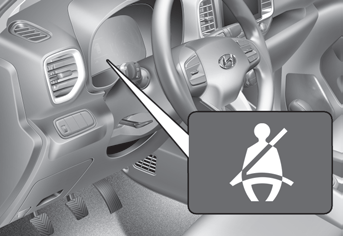Hyundai Venue: Brake System / Brake bleeding procedures
Hyundai Venue (QX) (2020-2025) Service Manual / Brake System / Brake bleeding procedures
| Brake System Bleeding |
Nomal Brake System
|
| 1. |
Make sure the brake fluid in the reservoir is at the MAX (upper) level
line.
|
| 2. |
Have someone slowly pump the brake pedal several times, and then apply
pressure.
|
| 3. |
Loosen the right-rear brake bleed screw (A) to allow air to escape from
the system. Then tighten the bleed screw securely.
[Front]
[Rear Drum Brake Type]
[Rear Disc Brake Type]
|
| 4. |
Repeat the procedure for wheel in the sequence shown below until air
bubbles no longer appear in the fluid.
|
| 5. |
Follow the sequence as shown below.
|
| 6. |
Refill the master cylinder reservoir to MAX (upper) level line.
|
ESC Bleeding of Brake System
|
This procedure should be followed to ensure adequate bleeding of air and filling
of the ESC unit, brake lines and master cylinder with brake fluid.
| 1. |
Remove the reservoir cap and fill the brake reservoir with brake fluid.
|
| 2. |
Connect a clear plastic tube to the wheel cylinder bleeder plug and
insert the other end of the tube into a half filled clear plastic bottle.
|
| 3. |
Connect the GDS to the data link connector located underneath the dash
panel.
|
| 4. |
Select and operate according to the instructions on the GDS screen.
|
| 5. |
Have someone slowly pump the brake pedal several times, and then apply
pressure.
|
| 6. |
Pump the brake pedal several times, and then loosen the bleeder screw
until fluid starts to run out without bubbles. Then close the bleeder
screw (A).
[Front]
[Rear Drum Brake Type]
[Rear Disc Brake Type]
|
| 7. |
Repeat the procedure for wheel in the sequence shown below until air
bubbles no longer appear in the fluid.
|
| 8. |
Refill the master cylinder reservoir to MAX (upper) level line.
|
 Troubleshooting
Troubleshooting
Troubleshooting
Problem Symptoms Table
Use the table below to help you find the cause of theproblem. The numbers indicate
the priority of the likecause of the problem...
 Repair procedures
Repair procedures
Operation and Leakage Check
Check all of the following items :
Component
Procedure
Brake Booster (A)
Check brake operation by applying the brakes during a test drive...
Other information:
Hyundai Venue (QX) (2020-2025) Owners Manual: Good Driving Practices
Never take the vehicle out of gear and coast down a hill. This is extremely dangerous. Don't "ride" the brakes. This can cause the brakes and related parts to overheat and malfunction. When you are driving down a long hill, slow down and shift to a lower gear...
Hyundai Venue (QX) (2020-2025) Service Manual: Description and operation
Description Intake Air Temperature Sensor (IATS) is included inside Manifold Absolute Pressure Sensor and detects the intake air temperature. To calculate precise air quantity, correction of the air temperature is needed because air density varies according to the temperature...
Categories
- Manuals Home
- 1st Generation Venue Owners Manual
- 1st Generation Venue Service Manual
- Shift-lock system, Shift-lock release, Parking
- Lighting control
- To set Cruise Control speed
- New on site
- Most important about car
Seat Belt Warning Light
Seat belt warning light (for driver’s seat)

As a reminder to the driver, the seat belt warning light will illuminate for approximately 6 seconds each time you place the ignition switch to the ON position regardless of belt fastening. However, if the seat belt is unfasted, a warning chime will sound for approximately 6 seconds.
Copyright © 2025 www.hvenueqx.com













